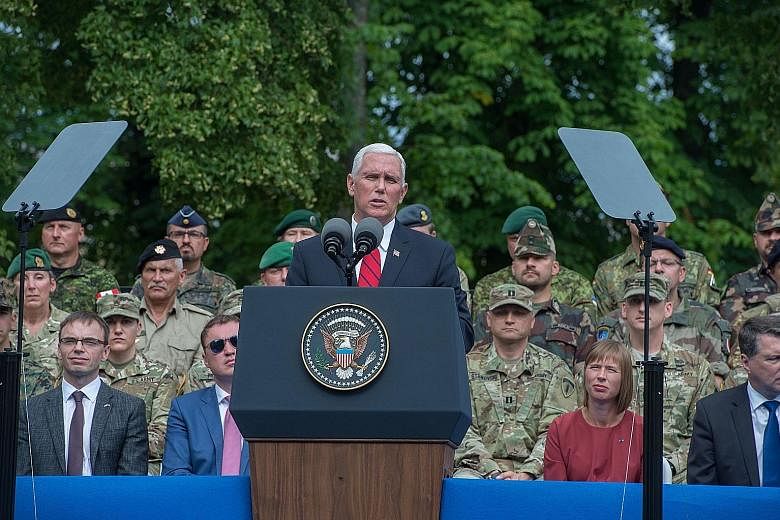TALLINN • Vice-President Mike Pence said the United States stands with the Baltic nations against any threats from Russia as relations deteriorate between the former Cold War foes.
Russia's expulsion of American diplomats and embassy staff "won't deter" US commitments to its allies, Mr Pence said yesterday in a joint news conference with the presidents of Estonia, Latvia and Lithuania in Estonia's capital, Tallinn. His visit is part of a tour of eastern Europe that culminates tomorrow in Montenegro with a meeting of Balkan Nato members and aspirants.
"No threat looms larger in the Baltic states than the spectre of aggression from your unpredictable neighbour to the east," Mr Pence said. "At this very moment, Russia continues to seek to redraw international borders by force, undermine democracy of sovereign nations and divide the free nations of Europe one against another."
Russia has told the US it must cut staff at its embassy and other facilities in Russia by 755 people by Sept 1 in retaliation for a new sanctions law passed by the US Congress last week, President Vladimir Putin said on Sunday.
US President Donald Trump, despite having sought to improve ties with Mr Putin, is set to sign the legislation, which strips him of the power to unilaterally revoke the penalties.
Mr Pence said the US "hopes for better relations with Russia".
But Mr Putin said that now seemed a distant possibility.
"We waited for quite a long time that, perhaps, something will change for the better. We held out hope that the situation would somehow change," Mr Putin said in an interview on state-run Rossiya 1 television, which published a Russian-language transcript on its website. "But, judging by everything, if it changes, it will not be soon."
He said the staff reduction was meant to cause real discomfort for Washington and its representatives in Moscow. "Over 1,000 employees - diplomats and technical workers - worked and continue to work today in Russia; 755 will have to stop this activity," he said. "That is biting."
The measures were the harshest such diplomatic move since a similar rupture in 1986, in the waning days of the Soviet Union.
Washington's response on Sunday was muted. "This is a regrettable and uncalled-for act," the State Department said in a statement. "We are assessing the impact of such a limitation and how we will respond to it."
Congress passed the new sanctions to punish Russia for interfering in the 2016 election, including releasing hacked e-mail embarrassing to Mrs Hillary Clinton's campaign. Congress is also investigating the possibility of collusion between the Trump campaign and the Russian government, with Mr Trump's eldest son Donald J. Trump Jr recently confirming that he met a Russian lawyer linked to the government who wanted to discuss removing an earlier round of sanctions.
Mr Putin has denied any Russian interference in the election. His spokesman Dmitry Peskov yesterday insisted that any hopes of mending Russia-US ties rest on "curing the worsening political schizophrenia" in Washington and said the two sides appeared "far away" from any improvement.
But he did insist Russia remained keen on "continuing cooperation in the areas that correspond to our interests", suggesting Moscow remains open to working together on Syria after agreeing a ceasefire with the US in the south of the country.
Mr Peskov also said the US can include its local employees among the 755 diplomatic staff it must cut, tempering the impact.
The clarification means there will not necessarily be a mass expulsion of US diplomats.
The vast majority of the US' roughly 1,200 embassy and consulate staff in Russia are Russian citizens.
BLOOMBERG, NYTIMES, REUTER
Russian sanctions
Since 2014, the US government has imposed a series of sanctions against Russia, hurting its economy. Russia responded this week.
US SANCTIONS
2014: The Obama administration and the European Union introduced targeted measures against Russian individuals and businesses after Russia annexed Crimea and backed separatists in eastern Ukraine. Also targeted members of President Vladimir Putin's elite entourage. Assets were frozen and restrictions imposed on Russia's oil industry, as well as its state finance, technology and arms sectors.
2016: The US expelled 35 Russian diplomats and closed two Russian compounds after what the US intelligence community concluded was Russian government-backed meddling in the 2016 presidential election.
2017: Additional sanctions focus on a range of industries. Several provisions target Russia's energy industry, with new limits on investment by Americans and US firms in Russian energy companies. For example, US companies would be barred from participating in energy exploration projects where Russian firms have a stake of 33 per cent or higher. The Trump administration has the option of imposing sanctions on firms helping to develop Russian export pipelines, such as the Nord Stream 2 pipeline carrying natural gas to Europe, in which German companies are involved.
RUSSIA'S RESPONSE
•Orders the US to cut diplomatic staff in Russia by 755 people by Sept 1. Most of these are thought to be Russian support staff.
•The US is also ordered to vacate a recreational villa and warehouse facilities in Moscow by today.
Source: Reuters, BBC

